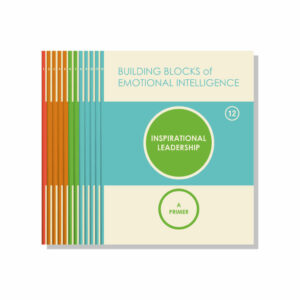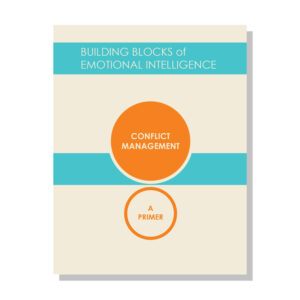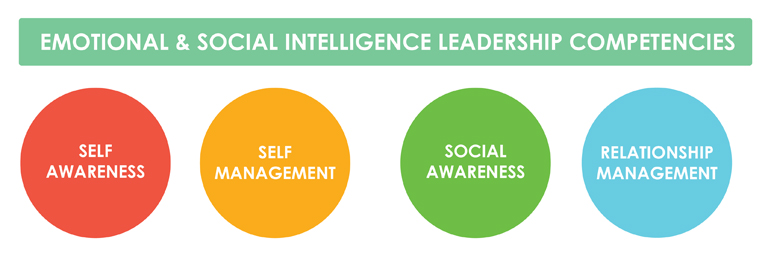

Emotional and Social Intelligence Leadership Competencies: An Overview
April 11, 2017 Time to read: 3 min.Emotional Intelligence, a different way of being smart, is a key to high performance at all levels, particularly for outstanding leadership.
Emotional Intelligence is the capacity to recognize our own feelings and those of others, and to manage emotions effectively in ourselves and our relationships. It is about much more than just having empathy or being “sensitive” – that’s a common misconception about EI.
Emotional and Social Intelligence Leadership Competencies are each a learned capacity, based on Emotional Intelligence, which contributes to effective performance at work – and often greater satisfaction in life as well.
There are four parts, or domains, to the Emotional and Social Intelligence Leadership Competency Model developed by Daniel Goleman and Richard Boyatzis:
- Self-Awareness
- Self-Management
- Social Awareness
- Relationship Management
Within each of these four domains nest learned competencies based on the underlying ability that make people outstanding performers in the workplace. These are skills that can be developed, just as you can improve upon anything that you practice regularly.
Richard Boyatzis, a business professor at Case Western Reserve University, and Daniel Goleman analyzed the range of competencies that companies identified in their outstanding leaders. They distilled them down to twelve generic competencies that embody the core of distinguishing abilities of leaders in organizations across a broad spectrum of industries.
The twelve competencies and their brief definitions are below. For more in-depth information, see our Primer Collection (available individually, or a set), or Crucial Competence, a video series with Daniel Goleman and fellow thought-leaders in research and Emotional Intelligence.
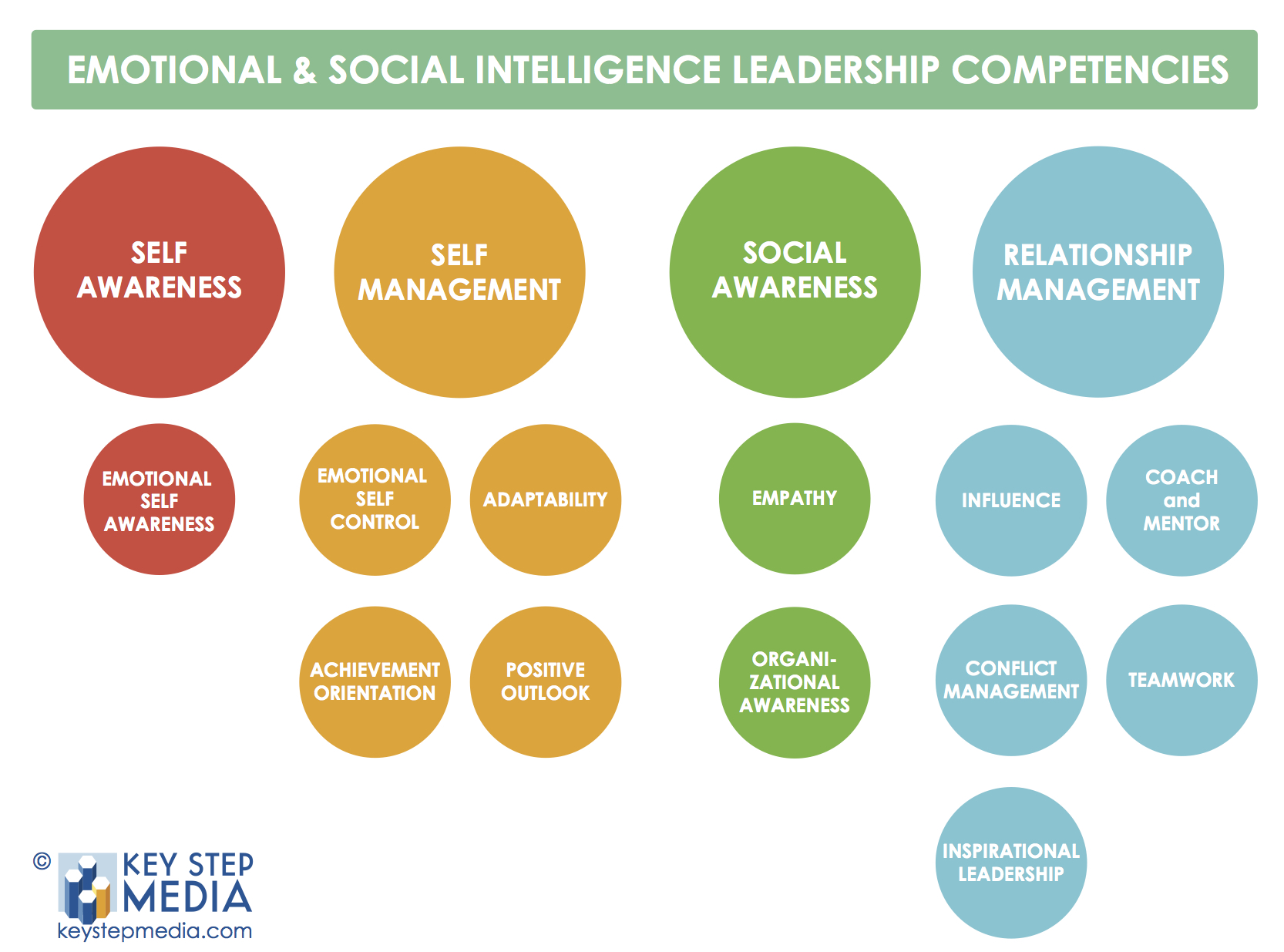
Self-Awareness
- Emotional Self-Awareness: The ability to understand our own emotions and their effects on our performance.
Self-Management
- Emotional Self-Control: The ability to keep disruptive emotions and impulses in check and maintain our effectiveness under stressful or hostile conditions.
- Achievement Orientation: Striving to meet or exceed a standard of excellence; looking for ways to do things better, set challenging goals and take calculated risks.
- Positive Outlook: The ability to see the positive in people, situations, and events and persistence in pursuing goals despite obstacles and setbacks.
- Adaptability: Flexibility in handling change, juggling multiple demands, and adapting our ideas or approaches.
Social Awareness
- Empathy: The ability to sense others’ feelings and perspectives, taking an active interest in their concerns and picking up cues about what others feel and think.
- Organizational Awareness: The ability to read a group’s emotional currents and power relationships, identifying influencers, networks, and organizational dynamics.
Relationship Management
- Influence: The ability to have a positive impact on others, persuading or convincing others in order to gain their support.
- Coach and Mentor: The ability to foster the long-term learning or development of others by giving feedback, guidance, and support.
- Conflict Management: The ability to help others through emotional or tense situations, tactfully bringing disagreements into the open and finding solutions all can endorse.
- Inspirational Leadership: The ability to inspire and guide individuals and groups towards a meaningful vision of excellence, and to bring out the best in others.
- Teamwork: The ability to work with others towards a shared goal; participating actively, sharing responsibility and rewards, and contributing to the capability of the team.
Based on their findings, Goleman and Boyatzis developed a 360-degree rating instrument called the Emotional and Social Competency Inventory (ESCI). A 360-degree assessment instrument has leaders rate themselves, and also be rated by the people whom they trust and whose opinions they value. This gives the fullest picture, combining a self-assessment with the same evaluations by other people.
Recommended Reading:
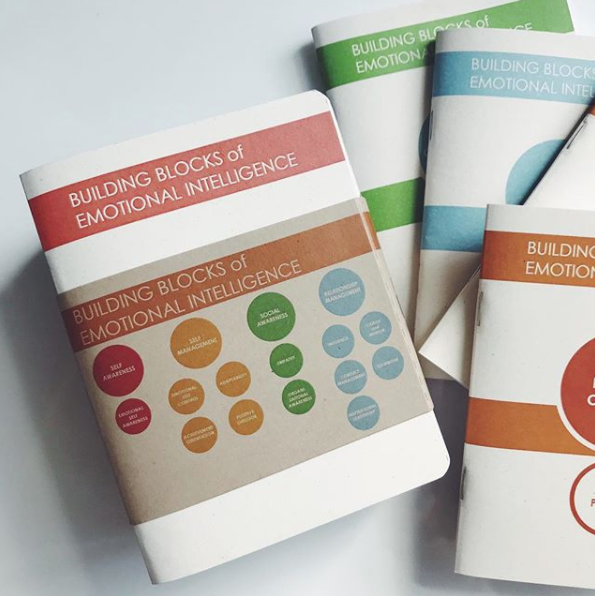 Our new primer series is written by Daniel Goleman, Richard Boyatzis, and fellow researchers, thought leaders, and coaches in the field of Emotional Intelligence. Each primer provides a full definition of the competency, and offers research and guidance for the reader to develop the competency in their own personal and professional life.
Our new primer series is written by Daniel Goleman, Richard Boyatzis, and fellow researchers, thought leaders, and coaches in the field of Emotional Intelligence. Each primer provides a full definition of the competency, and offers research and guidance for the reader to develop the competency in their own personal and professional life.
These primers are concise and easily digestible, and are an excellent for resource for leaders and managers, HR professionals, coaches and consultants, educators, and anyone interested in developing the Emotional and Social Intelligence Leadership Competencies.
See the complete primer Collection (available individually, or a set).
For more in-depth insights, see the Crucial Competence video series!


